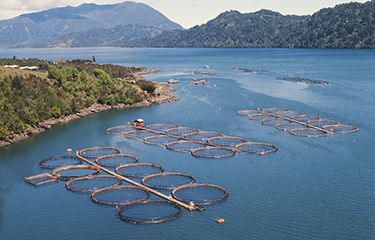The seafood industry is firing back against recently published articles and books that are taking shots at the farmed salmon industry.
A recently published book, Salmon Wars, the Dark Underbelly of our Favorite Fish, has been gaining attention from some media outlets, including Bloomberg, which listed it among the 10 best summer books shedding light on “today’s most-pressing issues.” Written by Pulitzer Price-winning journalist Douglas Frantz and his wife – accomplished investigative journalist Catherine Collins – the book purports to expose the “dark underbelly of our favorite fish.”
A recently published counterpoint in Saving Seafood, however, rebutted a number of claims in the book – including that net-pen salmon farms have a “toxic stew” underneath them.
“Farmers know that pristine marine conditions are essential for high-quality salmon. When salmon farms are properly sited in deep, fast-moving waters, the massive ocean space quickly assimilates organic fish waste,” Saving Seafood wrote. “Natural assimilation of organic waste is known to be a best solution from an environmental perspective. Lobsters thrive around salmon farms and catch landings remain strong in Canada and the U.S.”
In addition to the book, Time Magazine recently published a story from Frantz and Collins titled “3 Reasons to Avoid Farmed Salmon.”
That article largely pulls from the same pool of information the couple used to write the book is another example of falsehoods targeting seafood, according National Aquaculture Association President Sebastian Belle.
“There is a war being waged against science by activists that would prefer decisions be based on politics, anecdotes, and shameless misrepresentations and the authors deliver on this approach by basing their arguments on false factoids pulled from the news or discredited old studies in place of real facts,” Belle wrote in an op-ed to Time Magazine.
Belle said Frantz and Collins were wrong to write that salmon are raised “crammed” in cages and that fish are doused with antibiotics.
“Salmon are grown in sea cages that contain less than 4 percent fish and more than 96 percent water,” Belle wrote. “Salmon are raised with little or no antibiotics under the watch of veterinarians. Farmers have a stewardship responsibility to care for the animals they raise. Farm-raised salmon receive the least medicines out of all the most-popular animal proteins we buy at the grocery store.”
The book and article are the latest examples of documentary and media criticism of the seafood industry – and, in particular, the farmed-salmon industry – that seafood advocates have responded to. Recent Netflix-based movie Don’t Look Up included lines about how farmed salmon looks “fake” compared to the wild counterpart, a moment that Jennifer Bushman – a strategic development consultant for the seafood industry that has worked with brands like Kvaroy Arctic, Verlasso, Love the Wild, and Blue Ocean Mariculture – said highlights the false narratives aquaculture has to face.
“This five-second moment of dialogue, in one fell swoop, had more power and eyeballs than those of us in the blue foods community might actually have in our entire careers. It’s a moment where he implies to the audience – that even when the world is coming to an end – do not eat farmed fish,” Bushman wrote in a SeafoodSource op-ed. “This false narrative on aquaculture from an actor well-known for his support of environmental initiatives, and others like it in the media, are highly detrimental to our mission and push viewers to adopt a belief that will hurt our food system in the long term.”
Salmon Wars also isn’t the first anti-seafood media that has come out in the last few years – Seaspiracy, also released on Netflix, was heavily criticized by the seafood industry after its debut in 2021.
The continued attacks against finfish aquaculture are unwarranted, Belle said.
“Consumers have the right to choose what foods they eat. They also have the right to expect ‘investigative journalists’ to do the homework needed to present them with fact, not fiction,” Belle wrote of Salmon Wars. “Ms. Collins and Mr. Frantz feel that farm-raised salmon is a new fish and an ‘industrialized imposter.’ This would describe 100 percent of the farmed food products we eat that have, over centuries, replaced wild foods because nature could not keep up with growing demand.”
Photo courtesy of MARCELODLT/Shutterstock







